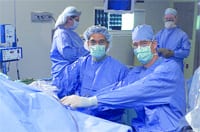Milestone Disk-replacement Procedure Performed At Holyoke Medical Center
In early April, a young woman with long-standing pain in her right arm came to Holyoke Medical Center (HMC) for a disk replacement in her neck. The next day, with her pain relieved, she went home.
That may sound fairly routine, but it’s not. The procedure was actually a milestone in the region, as the woman received the first investigational CerviCore cervical intervertebral disk replacement in New England. In addition, this was the first medical device trial approved by the U.S. Food and Drug Administration (FDA) in which HMC has participated — one that hospital officials hope leads to many more.
“I learned about this device a year and a half ago, and I wanted Holyoke to become a trial site,” said Dr. Christopher Comey, the neurosurgeon who performed the disk replacement along with his partner, Dr. Kamal Kalia. Comey noted that just 40 to 50 surgeons at 25 sites nationally are participating in this clinical trial.
The CerviCore device is intended to replace a degenerated disk in the spine. It is designed to maintain motion and may improve function. CerviCore employs a unique metal-on-metal design, using a pair of saddle-shaped bearing surfaces to achieve coupled motion and reproduce the mechanics of the natural joint. The metal is cobalt chromium, a material with a long history in knee and hip replacements and a track record of longevity and durability.
“The current standard of care involves removing the entire disk and placing bone in the disk space, and then a plate-to-fuse (eliminate) the joint,” Comey said.
The concern has been that, by eliminating a joint, you put stress on the surrounding joints that now have to do more work.”
Comey compared it to a knee replacement, explaining that, if a surgeon fuses a patient’s knee joint, stress on the ankle is increased, making it considerably more difficult to move the leg than before. But if the knee joint is completely replaced, the artificial joint relieves stress on the other joints, permitting greater motion in the leg.
Likewise, “the appeal of motion-preserving device is that it may put less stress on the surrounding joints and maybe lead to fewer subsequent problems in patients,” Comey said. CerviCore is designed to approximate the natural motion of the neck and spine so patients may not be limited in their movements following the surgery.
Stryker Spine, the New Jersey-based study sponsor and manufacturer of the CerviCore device, has begun running regional radio and television advertisements, approved by the FDA and the Institutional Review Board, to recruit patients to take part in the nationwide trial. Meanwhile, Holyoke Medical Center continues to screen potential patients with neck and arm pain who might be interested in participating in the study.
In all, a total of 400 patients will be enrolled in the trial, and “we’d like to contribute at least 20 patients to that group,” Comey said.
He noted that the CerviCore trial is the first FDA trial of a spinal device in Western Mass., and the only one currently being conducted.
“To my knowledge, there has never been a trial done for spinal disk implants here,” he said. “We did a tremendous amount of work to land the study, and it has been a tremendously positive thing for the medical center.
“Our vision is to be involved in other FDA activities involving emerging technologies,” Comey continued. “Now that the first one is under our belts, subsequent studies will be very straightforward.”



Comments are closed.